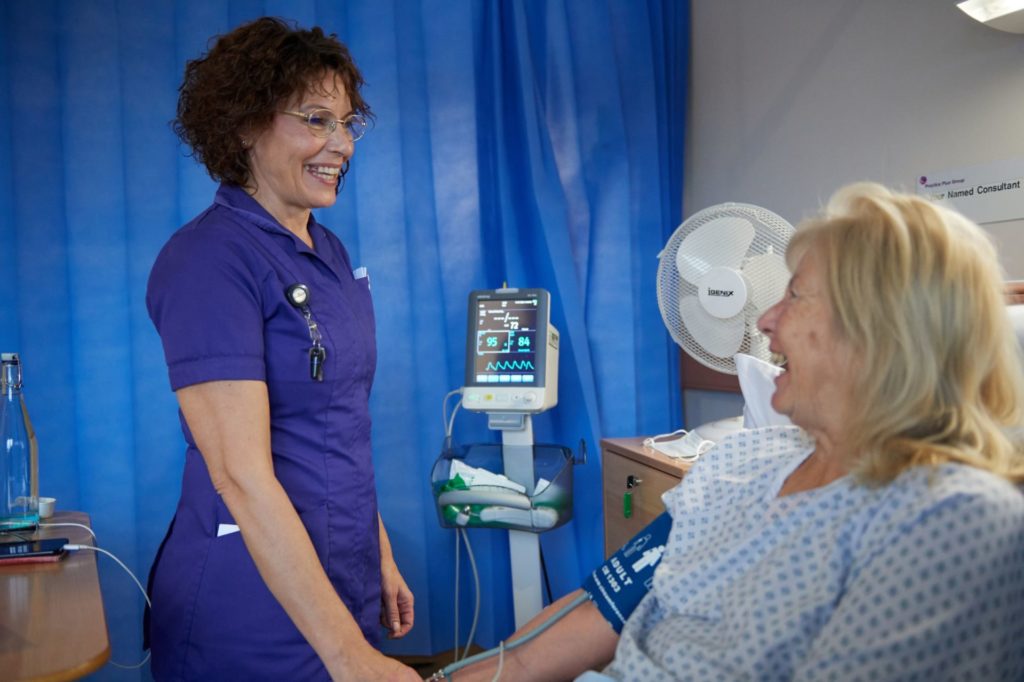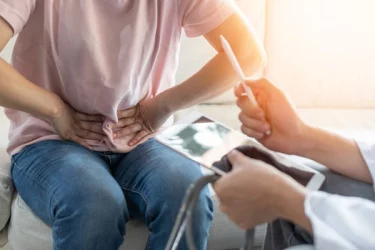Find general surgery near you
Barlborough
Birmingham
Devizes
Emersons Green
Gillingham
Ilford
Plymouth
Shepton Mallet
Southampton
St Mary’s Portsmouth
General surgery waiting lists
At Practice Plus Group, the average waiting time for private general surgery is 4-6 weeks.
Types of general surgery
Explore the different surgical procedures available across Practice Plus Group…
Basal cell carcinoma
These are the most common form of skin cancer and are generally a result of too much exposure to ultraviolet light. Although they are rarely life-threatening, they can cause significant disfigurement if left untreated. They are usually removed during surgery.
Please note, this procedure is not available at Practice Plus Group Hospitals, Ilford or Gillingham.
EUA of the rectum
Examination Under Anaesthetic (EUA) of the rectum is a means of examining the colon and anal parts of the body using a special instrument in order to diagnose conditions. Patients cannot request this as a standalone procedure.
Gallbladder surgery
For patients with symptomatic gallstones, it is recommended that the gallbladder is removed surgically, usually via laparoscopic 'keyhole' surgery. This is a minimally invasive procedure that is usually performed as a day case.
Hernia repair surgery
This is where an internal part of the body pushes through a weakness in the muscle or surrounding tissue wall. Hernias can occur anywhere in your abdomen, and there are a number of different types - inguinal, femoral, umbilical, incisional and abdominal.
Inguinal hernia repair
An inguinal or groin hernia is common and occurs mainly, but not only, in men. Fatty tissue or a part of the bowel pokes through a weak spot in the abdominal wall into the inguinal canal, through which blood vessels pass to the testicles. Surgery pushes the bulge back into place and strengthens the abdominal wall. Either open or laparoscopic 'keyhole' surgery can be performed in these cases.
Femoral hernia
A femoral hernia, also a form of groin hernia, is when fatty tissue or part of your bowel pokes through a weak spot in the abdominal wall into the femoral canal, through which blood vessels pass to and from your leg. During surgery, again, the bulge is pushed back into place, and the abdominal wall is strengthened. Either keyhole or open surgery can be performed in these cases.
Incisional hernia
Unlike other abdominal wall hernias, incisional hernias occur through a weakness at the site of the abdominal wall closure. Incisional hernias can occur after any type of laparotomy incision (a surgical incision into the abdominal cavity) but are most common after midline (especially upper midline) and transverse incisions.
Most incisional hernias can be diagnosed by a review of the patient’s history and by clinical examination. Patients typically present with an abdominal bulge in the region of the surgical scar. Many incisional hernias are asymptomatic, but 20-50% present with pain. Skin changes may occur in large and in longstanding hernias.
Not every patient who presents with an incisional hernia is suitable for surgical repair, and the risk of surgery must be balanced against the risk of complications if the hernia is left untreated.
When an operation is needed, it often requires that you’re admitted to hospital for a few days after the procedure is performed.
Recurrent hernia
If a hernia reoccurs it can be more difficult to repair due to scarring from the original surgery. Either keyhole or open surgery (eventually reopening the old scar) might be used in these cases.
Umbilical hernia
Umbilical hernias are common in adults and result from a weakness in the umbilicus (“belly button”) and usually cause few symptoms. If they become painful or cause problems with activities of daily living, they can be simply repaired surgically.
Surgical skin lesion removal
Benign skin lesion removal is a procedure involving the surgical removal of small skin cysts or lesions. These are usually performed under local anaesthetic, although in some cases general anaesthetic can be recommended.
Minor plastic surgery
Surgery is performed by plastic surgeons to remove unsightly moles, scars, birthmarks and cysts that are benign. These are procedures that require your GP to secure funding prior to referral and treatment.
Please note, plastic surgery is not available at Practice Plus Group Hospitals Ilford or Gillingham.
Treatment of anal fistula
This is a small channel that develops between the end of the bowel (rectum or anal canal) and the skin near the anus (“back passage”), frequently after a perianal abscess that didn’t completely heal. Anal fistulae can be painful and frequently bleed or leak cloudy fluid when you go to the toilet. Surgery is commonly required in these cases.
Treatment of anal fissure
Anal fissures are tears on the lining of the anus, usually associated with constipation or episodes of severe diarrhoea. If it becomes chronic, it can be painful and bleed profusely. A range of treatments are available (conservative treatment with ointments, botulin toxin injection or lateral sphincterotomy). Either of these improve the blood supply to the fissure, thereby aiding healing.
Treatment of haemorrhoids
There are various surgical treatments for haemorrhoids (piles), depending on the patient’s particular condition. Rubber band ligation, haemorrhoidal artery ligation and haemorrhoidectomy are some options.
Treatment of pilonidal sinus
A pilonidal sinus is a cystic lesion under the skin, showing with a small hole in the skin, usually at the top of the cleft of the buttocks, where they separate. It can become infected, in which case it often warrants an urgent operation. If it is recurrently infected or, it becomes symptomatic, it may benefit from elective excision.
What is general surgery?
General surgery is a surgical specialty that focuses on the digestive tract (also called the alimentary canal) and abdominal contents.
Who is it for?
General surgery encompasses a wide range of issues. As such, it can be difficult to pinpoint exactly who would benefit from the featured procedures. Typically, general surgery is for people with digestive or stomach issues.
Getting a diagnosis
Before patients can receive a diagnosis, they will require a clinical examination. This includes blood tests and, often, imaging or endoscopic procedures. Some conditions may require exploratory surgery like laparoscopy. Rarer conditions may require referral to a tertiary clinic.
When to seek treatment
If you suspect you need to see a specialist, it’s a good idea to act on that thought. Your specialist will then be able to ascertain your next steps and whether or not you’d benefit from treatment.
To book an appointment with one of our specialist consultants, give us a call today or submit an enquiry form.
General surgery referrals
General surgery patients at Practice Plus Group do not require referrals.
Making a general surgery appointment
At Practice Plus Group, you’ll first need to book an appointment. During this initial consultation, a specialist will carry out a thorough assessment and recommend the best course of action. If your consultant feels surgery is needed, our bookings team will be in touch a few days after your consultation to get a date sorted for your procedure. Before your surgery you’ll meet your team of orthopaedic surgeons and nurses and begin your treatment.
Elective general surgery
This means that the surgery can be scheduled in advance. This is for patients with non-life threatening issues who choose to have surgery in order to enjoy a better quality of life.
One of the many benefits of choosing Practice Plus Group for your treatment is the ability to choose the time and place that suits you. We have 10 locations across the UK to choose from.
Risks and complications of general surgery
Each general surgery procedure carries its own risk. Your consultant will explain the risks of your specific surgery during your consultation.
What to expect
General surgery encompasses a lot of different procedures. Below we’ll give you a broad idea of how to prepare and what to expect from your experience.
Preparing for surgery
Before surgery, you will be booked in for an initial consultation. You’ll meet your dedicated surgeon and anaesthetist and have any necessary tests, including x-rays and blood tests. This is your opportunity to talk about your general health and medical history, ask questions and prepare yourself for the procedure. Please be aware that, depending on your specific issue, more than one assessment may be required.
Once you have had your initial consultation with the surgeon, you’ll be booked in for surgery at a time that suits you.
It’s helpful to start making healthy lifestyle changes a few weeks or months before surgery to prepare yourself for your recovery. This includes stopping smoking, eating a healthier diet and increasing your physical activity. You should also use this time to prepare your home so it’s suitable for your recovery and arrange for someone to collect you from the hospital.
You may be asked to refrain from eating or drinking for several hours before surgery.
During the procedure
The anaesthetic used during the surgery depends on the type of procedure you need. The same also goes for surgery duration. This depends on what you’re having done.
During your consultation, your surgeon will discuss what to expect during the procedure.
Recovery
Recovery depends on the type of surgery you’ve had. For instance, the estimated recovery time from hernia repair is between three and six weeks depending on the type of procedure.. However, patients that have been treated for skin lesions can expect to recover within two weeks. It’s also worth bearing in mind people recover at different speeds.
Choosing the best general surgery hospital
At Practice Plus Group, we have 10 different hospitals and surgical centres across the UK. They all offer a range of general surgery treatment options.
The cost of private general surgery in the UK
As general surgery encompasses a range of different procedures, it’s difficult to quantify the costs. However, Practice Plus Group can generally offer treatments at a lower cost than the majority of private healthcare competitors. For example, the total cost of hernia repair surgery at Spire Healthcare with consultation fee included is £4,485. At Practice Plus Group, hernia repair costs £3,299 (plus £95 consultation fee) giving a saving of £1,391.
Costs will also differ by location and availability. Take a look at our Prices page for a full list of costs.
General surgery consultants
Our experienced general surgeons have a wide range of surgical specialities and relevant qualifications.
Find a consultant general surgeon near you.
Ways to pay
There are 3 ways to access surgery at Practice Plus Group:
- Self-pay private healthcare
- Private health insurance
- NHS referral
Why choose Practice Plus Group?
At Practice Plus Group Hospitals we’re passionate about giving patients a positive experience and excellent clinical outcomes, with personalised care every step of the way. Whether you’re paying for yourself or using private medical insurance, with our short waiting times, unrivalled Care Quality Commission (CQC) ratings and high levels of cleanliness and infection control, we’ll make sure you’re looked after. In fact, we were the first provider to have all services rated ‘Good’ or ‘Outstanding’ by the CQC.










